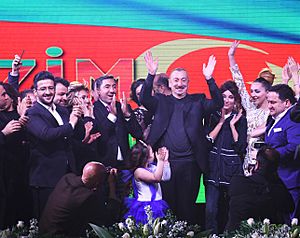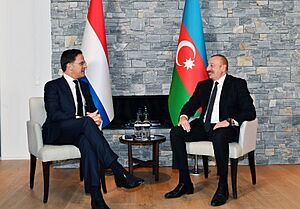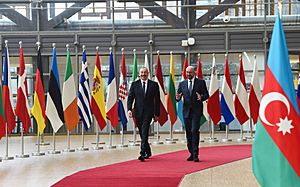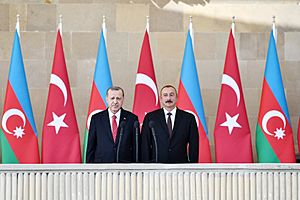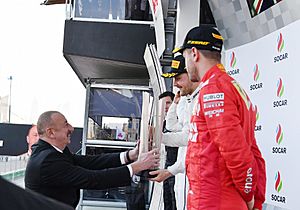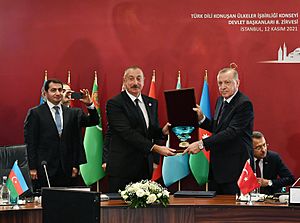Ilham Aliyev facts for kids
Quick facts for kids
Ilham Aliyev
|
|
|---|---|
| İlham Əliyev | |
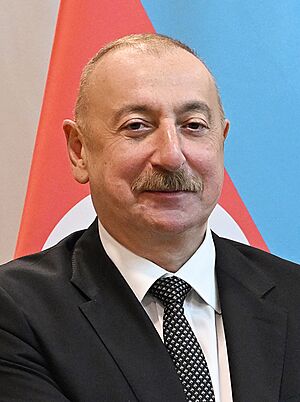
Aliyev in 2024
|
|
| 4th President of Azerbaijan | |
| Assumed office 31 October 2003 |
|
| Prime Minister |
|
| Vice President | Mehriban Aliyeva |
| Preceded by | Heydar Aliyev |
| Second Gentleman of Azerbaijan | |
| Assumed office 21 February 2017 |
|
| Vice President | Mehriban Aliyeva |
| Preceded by | Office established |
| 7th Prime Minister of Azerbaijan | |
| In office 4 August 2003 – 31 October 2003 |
|
| President | Heydar Aliyev |
| Preceded by | Artur Rasizade |
| Succeeded by | Artur Rasizade |
| Leader of the New Azerbaijan Party | |
| Assumed office 2005 |
|
| Deputy | Mehriban Aliyeva |
| Preceded by | Heydar Aliyev |
| Chairman of the Turkic Council | |
| In office 15 October 2019 – 12 November 2021 |
|
| Preceded by | Sooronbay Jeenbekov |
| Succeeded by | Recep Tayyip Erdoğan |
| Secretary General of the Non-Aligned Movement | |
| In office 25 October 2019 – 16 January 2024 |
|
| Preceded by | Nicolás Maduro |
| Succeeded by | Yoweri Museveni |
| Personal details | |
| Born |
İlham Heydər oğlu Əliyev
24 December 1961 Baku, Azerbaijan SSR, Soviet Union |
| Political party | New Azerbaijan Party |
| Spouse | |
| Children |
|
| Parents |
|
| Alma mater | Moscow State Institute of International Relations |
| Occupation | Politician |
| Signature |  |
Ilham Heydar Oghlu Aliyev (born 24 December 1961) is a politician from Azerbaijan. He has been the fourth president of Azerbaijan since 2003. He also leads the New Azerbaijan Party since 2005.
Ilham Aliyev is the son of Heydar Aliyev, who was also a president of Azerbaijan. Ilham became president on 31 October 2003. This happened after he served a short time as prime minister. He was re-elected in 2008. A change in the country's rules in 2009 allowed him to run for president as many times as he wanted. He was re-elected again in 2013, 2018, and 2024.
Azerbaijan has a lot of oil. This has helped Aliyev's government stay strong. It has also allowed the country to host big international events. Aliyev's family has become very wealthy. They have connections to many state-run businesses. They own parts of major banks, construction companies, and phone companies. They also have a share in the country's oil and gas industries.
Some people see Aliyev as a leader with very strong control. His government has faced criticism for not having completely free elections. There have also been concerns about human rights. His government has been known for limiting the work of journalists and groups that work for change.
The Nagorno-Karabakh conflict continued during Aliyev's time as president. In 2020, a major war happened. Azerbaijan took back control of some areas that were lost before. In 2023, Azerbaijan started another military action. This led to the surrender of the self-declared Republic of Artsakh. More than 100,000 ethnic Armenians living there had to leave their homes.
Aliyev's government has been accused of causing this mass movement of Armenians. There have also been accusations of serious actions during the conflict. These include destroying Armenian cultural sites.
Contents
|
Early Life and Education
Ilham Aliyev was born on 24 December 1961. His father, Heydar Aliyev, was president of Azerbaijan from 1993 to 2003. His mother, Zarifa Aliyeva, was an eye doctor. He also has an older sister named Sevil Aliyeva.
In 1977, Ilham Aliyev started studying at the Moscow State Institute of International Relations. He continued his studies there after graduating. In 1985, he earned a PhD degree in history. From 1985 to 1990, Aliyev taught at the same institute.
Early Career and Politics
From 1991 to 1994, Ilham Aliyev led several private businesses. In 1994, he became a vice-president at SOCAR. This is Azerbaijan's state-owned oil and gas company. He later became its first vice-president. He held this role until 2003.
Since 1997, Aliyev has been the president of the National Olympic Committee of the Republic of Azerbaijan. This committee helps organize sports in Azerbaijan.
In 1999, Aliyev was chosen as a deputy leader of the New Azerbaijan Party. This is the ruling political party. In 2001, he became the first deputy leader. In 2005, he was elected as the chairman of the party. The party has supported him for president in later elections.
In 1995, Aliyev was elected to the Parliament of Azerbaijan. From 2001 to 2003, he led Azerbaijan's group to the Parliamentary Assembly of the Council of Europe.
Becoming Prime Minister in 2003
In 2002, a change was made to Azerbaijan's rules. It said that the prime minister would take over if the president could not do their job. By early 2003, Heydar Aliyev's health was not good. People wondered if he could continue as president.
On 4 August 2003, Ilham Aliyev was made prime minister. This happened while his father was ill. Many people thought this was a way to prepare him to become president. After he was appointed, Ilham Aliyev said his father was getting better.
The Parliament of Azerbaijan approved Ilham Aliyev as prime minister. Most members voted for him. However, some political groups did not take part in the vote. They were worried that this was an attempt to keep power in the Aliyev family. They felt it would limit fair democratic processes.
During his short time as prime minister, Ilham Aliyev continued his father's policies. He focused on Azerbaijan's economy and foreign relations. He promised that the government's direction would not change much. But some critics said it was an "undemocratic power grab."
Ilham Aliyev wanted to run for president in October 2003. But the law said he could not do this while being prime minister. So, he took a break from his duties. Artur Rasizade became acting prime minister. This allowed Aliyev to focus on his presidential campaign.
President of Azerbaijan (2003–Present)
First Term (2003–2008)
Ilham Aliyev won the presidential election on 15 October 2003. He received 76.84% of the votes. However, some groups reported problems with the election. They mentioned arrests of people who disagreed with the government. They also noted police actions against journalists and protesters. Despite these concerns, Aliyev became president on 31 October 2003. After becoming president, he appointed Artur Rasizade as Prime Minister.
Aliyev worked to make his power stronger. In 2004, he created a "Foundation for Combating Corruption." This was meant to fight corruption in the government. But critics said that corruption still remained a big problem.
In the energy sector, Aliyev focused on making Azerbaijan important in the global oil market. A big step was finishing the Baku–Tbilisi–Ceyhan pipeline in May 2005. This pipeline helps Azerbaijan send its oil to other countries. It made Azerbaijan a key energy supplier.
Politically, Aliyev faced challenges from groups that disagreed with the government. This was especially true in the 2005 parliamentary elections. There were many reports of unfair practices during these elections. Protests happened because people felt the results were not fair. But the government quickly stopped these protests. Many opposition leaders were arrested. Aliyev's government then tightened control over the media.
Second Term (2008–2013)
Ilham Aliyev was re-elected in 2008 with 87% of the votes. Seven candidates ran in this election. Observers from the European Parliament said the election went smoothly. They noted some improvements in the election rules.
In March 2009, a change was made to the country's rules. This change removed limits on how many times a president could be re-elected. This meant Aliyev could run for president as often as he wanted. Some groups were concerned that this would give the president too much power.
During Aliyev's second term, there were protests in 2011. People wanted political changes and better economic conditions. They also wanted political prisoners to be released. The government used force to stop these protests. Many people were arrested. This led to criticism from international human rights groups.
Azerbaijan's economy during this time still relied heavily on oil and gas. Some watchdog groups raised concerns about how oil money was managed.
2013 Election
In the 2013 presidential elections, Aliyev won with 85 percent of the vote. This secured him a third five-year term. There was an unusual incident where the election results were accidentally released before voting even began. The election commission said it was a mistake.
Some international observers said the elections were fair. However, other groups, like the OSCE / ODIHR, noted limits on freedom of speech. The US State Department also said the elections did not meet international standards. Amnesty International called for the release of a human rights activist who reported problems during the election. There were also reports that some election observers were paid by groups connected to Azerbaijan.
Economically, Aliyev's third term was affected by a big drop in global oil prices starting in 2014. This hurt Azerbaijan's economy. The government tried to diversify the economy. They focused on farming, tourism, and technology. But oil and gas remained the main part of the economy. The Southern Gas Corridor project, which sends gas to Europe, made good progress.
Politically, Aliyev's government kept tight control. Groups that disagreed with the government faced difficulties. Many journalists and activists were arrested. The government said these actions were needed for stability. But human rights groups criticized these practices.
There were also protests in 2016 in Baku and other cities. People wanted political changes and better economic conditions. These protests were also met with police action.
The conflict with Armenia over Nagorno-Karabakh continued. There were small fights, and a bigger one in April 2016. Azerbaijani forces tried to take back land. A ceasefire was later put in place. Aliyev always said that Azerbaijan's land should be whole. He wanted a peaceful solution.
2018 Election
Ilham Aliyev won 86.02% of the votes in the 2018 presidential election. Most major opposition parties did not take part. There were also signs that the election was not completely fair.
In January 2019, thousands of people protested in Baku. They asked for the release of political prisoners. More protests happened in October 2019. People wanted fair elections and economic justice. Police broke up these protests. Many protesters, including opposition leaders, were detained.
In 2020, during the COVID-19 pandemic, the government put emergency rules in place. Critics said these rules were used to stop people from speaking out. Later that year, Azerbaijani forces took back more land in the Second Nagorno-Karabakh War. A big victory parade was held in December. The Turkish President, Recep Tayyip Erdoğan, attended. This showed stronger ties with Turkey.
From late 2023 into 2024, the government increased its control over independent media. Several journalists were arrested. They faced charges that many believed were politically motivated. International groups criticized these arrests.
Nagorno-Karabakh Conflict
As president, Aliyev has been involved in two conflicts over the Nagorno-Karabakh region. The Second Nagorno-Karabakh War in 2020 ended with Azerbaijan controlling much of the area. This land was previously held by ethnic Armenians. Another military action in 2023 led to Azerbaijan taking full control of the entire territory.
Foreign Policy
Under Aliyev, Azerbaijan has worked closely with the European Union (EU). It also has strong economic ties with Russia. Azerbaijan cooperates with NATO through a special plan. It also has close relations with the Organisation of Islamic Cooperation. Azerbaijan uses its oil wealth to promote a positive image of its government. This includes efforts to gain support for its projects.
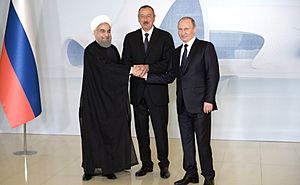
In 2019, Azerbaijan was chosen to lead the Turkic Council. It also led the Non-Aligned Movement for three years.
Relations with Armenia
In July 2025, Aliyev met with Armenian prime minister Nikol Pashinyan. This meeting took place in the United Arab Emirates. It was part of ongoing peace talks between their countries.
Relations with the United Nations
Ilham Aliyev has spoken at the United Nations General Assembly several times. He addressed the assembly in 2004, 2010, and 2017.
Relations with the European Union
Ilham Aliyev has increased cooperation with the European Union (EU). In 2004, Azerbaijan became part of the EU's European Neighbourhood Policy. In 2006, Aliyev signed an agreement for a special partnership with the EU.
In 2009, Azerbaijan was included in the Eastern Partnership Policy. In 2011, Aliyev signed a joint statement about the Southern Gas Corridor. This project aims to bring gas to Europe.
On 6 February 2017, Aliyev visited Brussels, the capital of the EU. He met with important EU officials. This led to a "Partnership Priorities" agreement between the EU and Azerbaijan in July 2018.
Relations with France
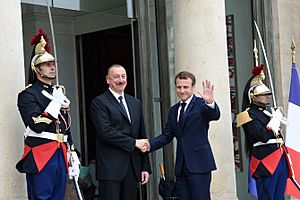
From 12–15 March 2017, Aliyev visited France. He met with leaders of international companies. He also met with the French president at the Élysée Palace. The French president said that the situation in Nagorno-Karabakh needed new talks. During the Second Nagorno-Karabakh War, France supported Armenia. Aliyev asked the French president to apologize for accusing Azerbaijan of using mercenaries.
Relations with Russia
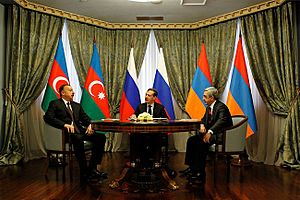
On 6 February 2004, Aliyev and Russian president Vladimir Putin signed an agreement. It set out the rules for relations between Azerbaijan and Russia. Aliyev also took part in the opening of the Year of Azerbaijan in Russia in 2005. In 2006, Aliyev and former Russian president Dmitry Medvedev signed a statement about the Caspian Sea. In 2018, Aliyev and Putin signed a statement on economic cooperation. Aliyev met with Russian and Iranian leaders in 2016. They discussed fighting terrorism and crime in the region. They also agreed to develop a transport route from India to Saint Petersburg.
Relations with the United States

Aliyev has met with several U.S. presidents. These include George W. Bush, Barack Obama, and Donald Trump.
Relations with NATO
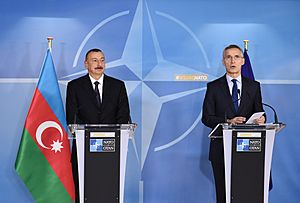
During Aliyev's presidency, Azerbaijan joined the Individual Partnership Action Plan with NATO. Azerbaijan has completed several plans with NATO. Ilham Aliyev presented Azerbaijan's first plan to NATO in Brussels in 2014.
Aliyev has attended several NATO meetings. Azerbaijan also helped with the NATO-led mission in Afghanistan.
Domestic Policy
Religious Policy
On 10 January 2017, Ilham Aliyev announced that 2017 would be the "Year of Islamic Solidarity." He provided money to organize related events. In 2014 and 2015, Aliyev also provided funds to promote understanding between different religions. He also supported restoring historical monuments in Azerbaijan.
Concerns about Corruption
There are concerns about corruption in Azerbaijan. According to Transparency International, Azerbaijan has a serious problem with corruption. In 2017, Transparency Azerbaijan said it had to reduce its work. This was because the government did not approve funding from outside the country. Transparency International stated that a ban on foreign grants has made it hard for groups working for change.
LGBT Rights
Discrimination against LGBT people is a serious issue in Azerbaijan. In 2020, ILGA-Europe said Azerbaijan was the worst country in Europe for LGBT rights. Human rights activists have criticized Aliyev's government on this issue.
International Sporting Events
Azerbaijan's oil wealth has allowed the country to host many big international events.
Aliyev has been the president of the National Olympic Committee since 1997. During his time as president, Azerbaijan hosted several international sports events. These include the 2015 European Games, the 4th Islamic Solidarity Games, and the 42nd Chess Olympiad. It also hosted the 2016 European Grand Prix (a car race). Aliyev attended many opening and award ceremonies. He presented prizes to the winners.
Economic Policy
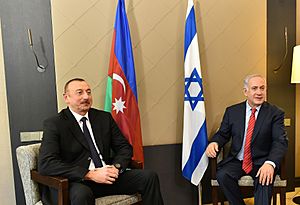
When Aliyev became president in 2003, Azerbaijan's economy was growing fast. This was thanks to its oil and gas. From 2005 to 2007, Azerbaijan had one of the fastest growing economies in the world. The country's oil wealth helped Aliyev's government stay strong. It also made the ruling families in Azerbaijan very rich.
However, times of low oil prices and rising costs have hurt Azerbaijan's economy. Aliyev's government has tried to make the economy more diverse. They want to rely less on oil and gas. They have focused on farming, tourism, and technology. But the country still depends mostly on oil and gas. The International Monetary Fund has asked Azerbaijan to diversify its economy.
The value of Azerbaijan's money has also been a challenge. Aliyev has sometimes criticized his own government officials. He has said they change economic plans too often. He also said they try to stop economic changes.
Personal Life
Ilham Aliyev married Mehriban Aliyeva in Baku on 22 January 1983. They have three children: Leyla, Arzu, and Heydar. They also have five grandchildren. He can speak Azerbaijani, English, French, Russian, and Turkish. His wife is the first Vice President of Azerbaijan.
Awards and Honors
National Awards
 Azerbaijan – Heydar Aliyev Order
Azerbaijan – Heydar Aliyev Order Azerbaijan – Order of Sheikhulislam
Azerbaijan – Order of Sheikhulislam
Awards from Other Countries
 Romania – Order of the Star of Romania (2004)
Romania – Order of the Star of Romania (2004) Saudi Arabia – Order of Abdulaziz Al Saud (2005)
Saudi Arabia – Order of Abdulaziz Al Saud (2005) Georgia – Order of Honor of Georgia
Georgia – Order of Honor of Georgia Bulgaria - Order of Stara Planina
Bulgaria - Order of Stara Planina France – Grand Cross of the Legion of Honor
France – Grand Cross of the Legion of Honor Poland – Order of Merit of the Republic of Poland
Poland – Order of Merit of the Republic of Poland Ukraine – First Class of the Order of Prince Yaroslav the Wise (2008)
Ukraine – First Class of the Order of Prince Yaroslav the Wise (2008) Kuwait – Order of Mubarak the Great
Kuwait – Order of Mubarak the Great Greece – Gold Medal of the Hellenic Republic
Greece – Gold Medal of the Hellenic Republic Latvia – Knight Grand Cross of the Order of the Three Stars
Latvia – Knight Grand Cross of the Order of the Three Stars Romania – Grand Cross of Faithful Service
Romania – Grand Cross of Faithful Service Tajikistan – Order of Ismoili Somoni
Tajikistan – Order of Ismoili Somoni Turkey – First Class of the Order of the State of Republic of Turkey (2013)
Turkey – First Class of the Order of the State of Republic of Turkey (2013) Ukraine – Order of Liberty (2013)
Ukraine – Order of Liberty (2013) Serbia – Order of the Republic of Serbia (2013)
Serbia – Order of the Republic of Serbia (2013) Italy – Knight Grand Cross with Collar of the Order of Merit of the Italian Republic (12 July 2018)
Italy – Knight Grand Cross with Collar of the Order of Merit of the Italian Republic (12 July 2018) Bulgaria – Friendship order of Bulgaria (2019)
Bulgaria – Friendship order of Bulgaria (2019) Kazakhstan – Order of the Golden Eagle (22 August 2022)
Kazakhstan – Order of the Golden Eagle (22 August 2022)
- From International Organizations
 CIS Medal For Distinction in Protection of CIS State Borders and Badge for Strengthening of Border Cooperation (2008).
CIS Medal For Distinction in Protection of CIS State Borders and Badge for Strengthening of Border Cooperation (2008). Organization of Turkic States – Supreme Order of Turkic World
Organization of Turkic States – Supreme Order of Turkic World
- Other Awards
 Turkey – İhsan Doğramacı Prize for International Relations for Peace
Turkey – İhsan Doğramacı Prize for International Relations for Peace Russia – Prepodobniy Sergiy Rodonejskiy first degree Order of Russian Orthodox Church
Russia – Prepodobniy Sergiy Rodonejskiy first degree Order of Russian Orthodox Church- International Military Sports Council – Grand Cordon Order of Merit
Honorary Degrees
Aliyev has also received special degrees from universities in many countries. These include Turkmenistan, Belarus, Russia, Bulgaria, Turkey, Ukraine, Kazakhstan, Romania, Jordan, Hungary, Azerbaijan, and South Korea.
See also
 In Spanish: Ilham Alíyev para niños
In Spanish: Ilham Alíyev para niños
 | Bayard Rustin |
 | Jeannette Carter |
 | Jeremiah A. Brown |


